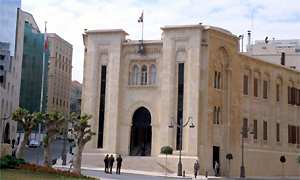 Lebanon’s largest opposition parliamentary group the Future Movement bloc said on Tuesday that it rejects the cabinet’s proposed electoral law which is based on proportionality, especially at this “particular” phase.
Lebanon’s largest opposition parliamentary group the Future Movement bloc said on Tuesday that it rejects the cabinet’s proposed electoral law which is based on proportionality, especially at this “particular” phase.
“We do not approve the electoral law based on proportionality, especially at this particular phase because of the control of armed de-facto forces in some Lebanese regions,” the statement said in an implicit reference to Hezbollah.
The bloc praised the kickoff of the meetings of the sub-committee discussing the country’s electoral law, which began earlier Tuesday.
Rival March 8 and 14 Lawmakers discussed on Tuesday several proposals in the first round of discussions aimed at reaching consensus on an electoral draft-law, the head of a parliamentary electoral subcommittee, MP Robert Ghanem, said.
“Discussions focused on each draft-law and we will continue to discuss them,” Ghanem told reporters after the three-hour meeting of members of the subcommittee. “The members of the subcommittee expressed similar views on several proposed draft-laws.”
Describing the meeting as “productive,” he said “several proposals were made to reach common ground.”
“The door is not closed to any other proposal,” he added.
Discussions resumed at 5:00 pm.
The meetings of the subcommittee on Tuesday come two days after the controversial proposal of the so called Orthodox Gathering ws approved by the rival Christian parties.
Phalange MP Sami Gemayel, Lebanese Forces MP George Adwan, and Future Movement MPs Ahmed Fatfat and Serge Torsarkissian, all from the March 14 opposition, are staying at the Etoile Hotel near the parliament building in downtown Beirut for security reasons.
The subcommittee’s MPs from the majority March 8 alliance are Hezbollah MP Ali Fayyad, the Free Patriotic Movement’s MP Alain Aoun, MP Ali Bazzi from Amal and Tashnag Party’s MP Hagop Pakradounian.
The subcommittee also includes MP Akram Shehayyeb from Walid Jumblat’s centrist National Struggle Front.
“We will seek to reach an agreement on the Orthodox Gathering proposal as soon as possible as long as there is Christian consensus on it and has received the backing of Hezbollah and Amal,” said Aoun upon arrival to parliament for Tuesday’s talks.
Torsarkissian told reporters at the assembly that the new “law would decide the fate of the country for years to come.”
The meeting was preceded by talks between members of the March 8 majority alliance on one side and the March 14 coalition on the other.
An Nahar daily said the FPM’s MPs hoped during a meeting held by the majority lawmakers in parliament that Hezbollah and Amal would approve the Orthodox Gathering proposal that calls for each sect to elect its own MPs.
Another meeting between March 8 officials was held at the residence of Energy Minister Jebran Bassil in Rabieh on Monday night. The meeting was attended by several MPs, Hezbollah leader’s aide, Hussein Khalil, and the party’s security official Wafiq Safa.
Bassil told An Nahar following the talks that the Orthodox proposal would be approved as long as the rival Christians have reached an agreement on it.
“The Christians have a true and rare opportunity to witness the adoption of an electoral law that gives them full representation,” he said.
Lebanon is set to elect new parliamentary representatives in 2013, but the country’s political circles are divided over the electoral law despite the cabinet’s approval in September of a draft law based on proportionality and 13 electoral districts.

Leave a Reply
You must be logged in to post a comment.